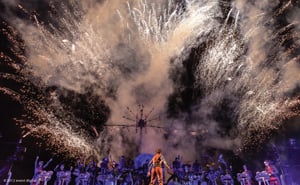Cross-channel collaboration
Geography has been no barrier to artistic ambition for Lakes Alive, the international Cultural Olympiad programme bringing street arts to Cumbria. Jeremy Shine describes the collaboration at its heart

Lakes Alive launched in May 2009 with a week of aerial spectacles in six locations across Cumbria, but we knew immediately, we’d have to do something just as special for the London 2012 Festival. One idea was to commission a large-scale spectacle – a tourable show involving international and local professional artists. Les Commandos Percu (LCP), based in Toulouse, France, seemed to fit the bill, presenting original percussive music drawn on European traditions and played on instruments they’ve designed themselves, with stunning pyrotechnics fired as they play to produce syncopated rhythms. They were booked for performances in 2010 and while they were here, their Artistic Director Raymond Gabriel ran a workshop for local artists and we discussed the project, ‘On the Night Shift’, in depth.
Meetings followed to agree a joint artistic vision and how to involve British artists. A good working relationship developed with LCP’s producer, based on mutual confidence which saw us through the many practical issues that arose, not least arranging rehearsals and complicated travel for everyone to fit in with busy schedules, and discussions about contracts and changes to the scale of the projects as income was secured or funding bids turned down. Inevitably many of the original ideas changed as the project progressed. An important issue was how to create a company combining 12 British artists from differing backgrounds and a French group who worked together year round. The first step was to recruit via a workshop, not auditions. Following an open call for participants in autumn 2011, 90 applications came in from across the country, about a third from outside the region. At this point, there was an artistic wobble as Ray suddenly said that to find 12 good performers, he would need to see 70 or 80 people, and that he wanted to whittle down numbers after each session. We felt this was unfair as the selected participants were giving up a weekend, without pay, so persuaded him to stick to the original plan of shortlisting 24.
When we gathered at Lanternhouse in Ulverston for the weekend workshop, there was immediately a spirit of friendliness and co-operation even though half of the participants knew they wouldn’t be selected. All the communal eating and clearing up helped to create L’Equipe – a real team spirit which has continued, even to the extent that the dancers arranged an extra unpaid day’s rehearsal by themselves, and one of the Company turned down a role in the opening ceremony of the Olympics because rehearsal dates clashed.
Once the team had been selected, the creation work started – scores and tracks crossed the Channel via the Internet; a closed Facebook page facilitated communication; and rehearsals were held in Ulverston, Manchester and Toulouse (which was cheaper than freighting equipment in). Ray was leading the process but was open to suggestions from the British artists especially the dancers who choreographed the dance themselves.
As we approach the premiere in front of an enormous crowd who will have earlier welcomed the Olympic torch, it is a good time to reflect on the experience and the lessons learned from the long-distance relationship. Our achievement has been related to five key factors: starting with a shared artistic vision between commissioner and artist; making sure that administrators understand how each other work and agree processes and timescales; understanding that a foreign group working with British artists will want to choose the artists; looking after the artists well; and allowing plenty of time for the gestation of the artistic ideas, planning the logistics and raising the money. Having mastered these, we are confident that we are on the road to success.
Join the Discussion
You must be logged in to post a comment.